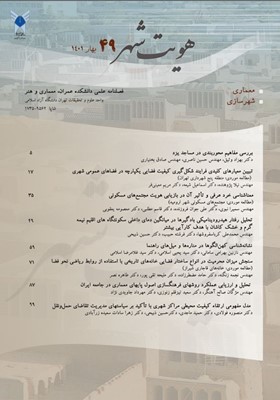معناشناسی خرد عرفی و تأثیر آن در بازیابی هویت مجتمعهای مسکونی (مطالعه موردی: مجتمعهای مسکونی شهر ارومیه)
محورهای موضوعی : معماریسمیرا نبوی 1 , علی جوان فروزنده 2 * , قاسم مطلبی 3 , معصومه یعقوبی 4
1 - دانشجوی دکتری، گروه معماری، واحد اردبیل، دانشگاه آزاد اسلامی، اردبیل، ایران.
2 - استادیار، گروه معماری، واحد اردبیل، دانشگاه آزاد اسلامی، اردبیل، ایران.
3 - دانشیار دانشکده معماری، پردیس هنرهای زیبا، دانشگاه تهران، ایران.
4 - استادیار، گروه معماری، واحد اردبیل، دانشگاه آزاد اسلامی، اردبیل، ایران.
کلید واژه: مجتمع مسکونی, خرد عرفی, الگوهای رفتاری, خاطرات جمعی, هویت مکان,
چکیده مقاله :
توجه به خرد عرفی، بهعنوان یکی از عوامل مهم و مؤثر در رابطه تجربی انسان-محیط از مسائلی است که در پژوهشها و فرایندهای طراحی معماری کمتر به آن پرداختشده است. مقاله حاضر باهدف ایجاد محیطهای مسکونی باکیفیت، به بررسی و شناسایی تأثیر مؤلفههای خردعرفی بر شکلگیری هویت مکان میپردازد. مقاله حاضر ازنظر نوع تحقیق: کیفی و کمی، ازنظر راهبرد: تفسیری- تحلیلی، ابزار جمعآوری دادهها مشاهده و مصاحبه و روش تحلیل دادهها همبستگی هست. نتایج پژوهش، ارتباط معنیدار بین خرد عرفی و هویت مکان را به اثبات میرساند. بین مؤلفههای خرد عرفی و مؤلفههای هویت مکان، بالاترین رابطه معنیدار همبستگی مربوط به مؤلفه الگوی رفتاری-کالبدی و در سطوح بعدی، مؤلفههای خاطرات جمعی و رضایتمندی هست. در طراحی معماری، چهار سنجه به ترتیب: خوانایی فرم، مصالح بومی و تنوع فعالیتی و بصری بیشترین عوامل تأثیرگذار هست.
Consideration of conventional wisdom as one of the significant and efficient factors in the experimental relation of human-environment is of the issues which have been less tackled with architectural research and processes. Crisis of place identity is a sign of disregard for physical-behavioral patterns in the place, and ultimately the separation of the place from people's experiences and desires. An important point and fundamental gap in place identity research is the lack of attention to the relationship between physical-behavioral patterns arising from the custom of societies and its impact on creating a place identity link. This type of communication, which is called conventional wisdom, is based on the two aspects of rationality and experience, which in the research literature is called conventional wisdom. Furthermore, the place identified as a preparatory space, human social interactions in their semantics, are directly influenced by conventional wisdom. Therefore, the balanced relationship that is formed between a person's place identity and the characteristics of his environment is of great significance. As a result, in the process of architectural design of living space, attention to culture, customs, beliefs, worldview, etc. of any society and its impact on collective identity is of particular importance. The present article tries to focus on creating quality residential environments, examines and identifies the effect of conventional wisdom components on the formation of place identity. Also, since housing covers a large part of cities, the architecture of residential complexes must be consistent with the values, customs, culture, beliefs, worldview, etc. of each community, and this through recognizing the aesthetic tastes of the people is possible. Therefore, the present article is correlational in terms of the type of research: qualitative and quantitative, in terms of strategy: interpretive-analytical, data collection tool, observation and interview, and data analysis method. In this regard, in order to respond to the stated objectives, after examining the proficient conventional wisdom components informing the place identity and extracting the conceptual model of the research, to assess the quality criteria and data validity, the Elahiyeh residential complex in Urmia is selected. This leads to using observation, and interview tools and descriptive statistics and data correlation analysis by SPSS software, the results have been reviewed. In order to identify the role of conventional wisdom as a context for the continuation of social behavior in creating place identity in residential complexes, three components of collective perception, rationality and actuality have been identified as the main structure of the conceptual model of conventional wisdom in place. The achievements of the research show a direct and significant relationship between the three components of conventional wisdom - rationality, collective perception, and actuality- with the variable of place identity, which confirms the conceptual model of the research. Findings of the research show that among the mentioned components, collective perception is the most major and effective component affecting the place identity. This means that attention to physical-behavioral patterns such as values, beliefs, cultural beliefs, etc. play an essential role in creating a place identity.
_||_

